“I spent half the year eating green zaatar!”
I heard that throughout my childhood, every time my dad was complaining about his boarding school days at Mar Yacoub in North Lebanon.
Recommended Stories
list of 4 items- list 1 of 4Sajad Shakoor brings hope and halal meals to California prisoners
- list 2 of 4The surfer chef behind South Africa’s first fine dining halal restaurant
- list 3 of 4The legendary flavoured ground salt from India: Pisyu loon
- list 4 of 4Revisiting molokhia amid war and displacement in Gaza
He despised the school for many reasons, but the terrible food was a major one. As a child, he would go off into the wilderness to pick green zaatar (fresh thyme) which grew in the spring months.
He would then mix it with fresh onion, whenever available, and some olive oil, wrap it in thin, delicate Lebanese bread and fill his belly with something he could digest both physically and mentally.
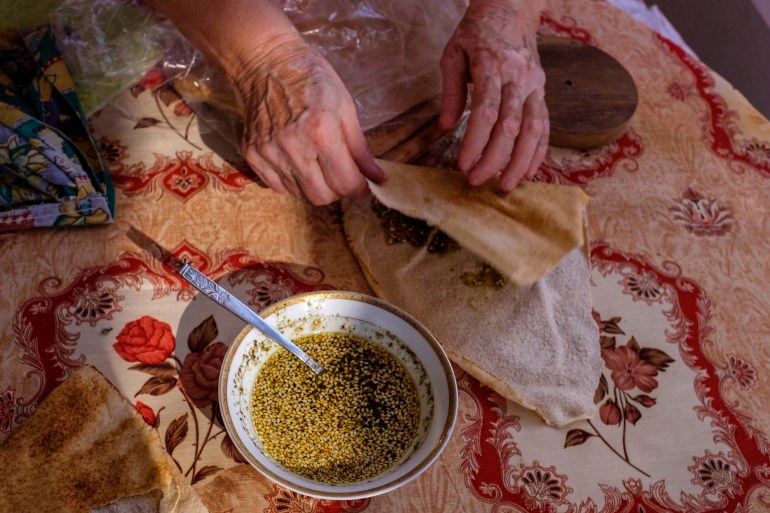
“I ate out of my mouneh.”
Mouneh is an Arabic word that literally means provisions and is used to refer to the preserves traditionally put up by Lebanese families every year. They can include pickles, jams, herbal teas, kishk (dried yoghurt mixed with bulgur wheat), syrups, tomato paste, grape leaves, olives, zaatar, and dried vegetables like eggplants that we call “adeed”.
There was a time when our ancestors from Mazraat al-Toufah (the Apple Orchard), a northern village nestled in a valley across from Mizyara and just below Ehden, sustained themselves mostly from the land.
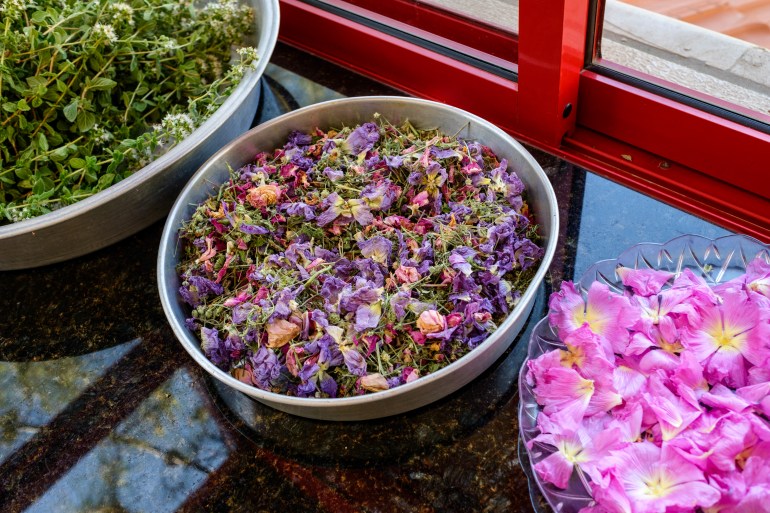
This tradition has been passed on from generation to generation. Although fewer and fewer people practised it as time went on and more Lebanese moved to the cities, it remained an important rite of passage to get some mouneh from the village to eat back in town. And today, homemade mouneh is making a comeback.
My father’s mother, my Grandmother Asma made her own mouneh every year, and my Aunt Amaline, his sister, grew up watching her and learning her ways instinctively.
Aunt Amaline is now 85 years old and still forages for zaatar, picks grape leaves, and makes her own apricot jam.
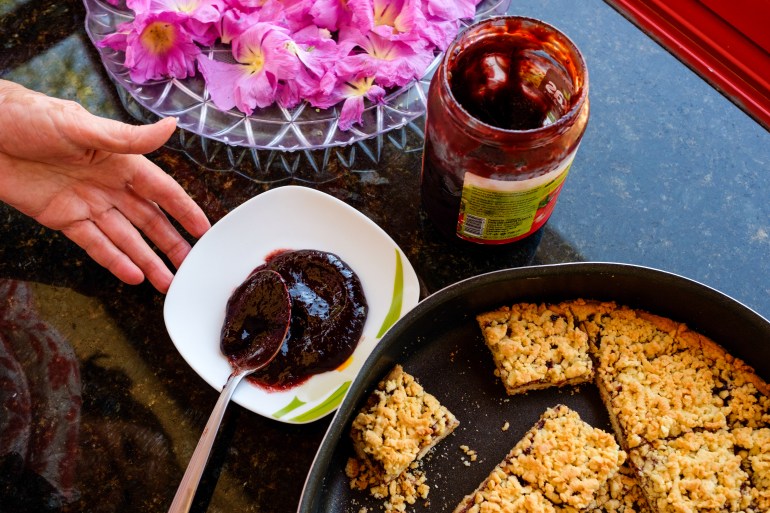
For her, it’s all about taste and quality, although for others these days, cost plays a huge part in deciding to preserve more food.
“People in the village started planting again because things are so expensive, yes, but mouneh is more than that.
“Aside from money, when we were young, we didn’t have these things available in the winters. Our village felt isolated at that time. If you didn’t prepare yourself, you couldn’t eat. People ‘tricked’ nature to live off the land year-round.”
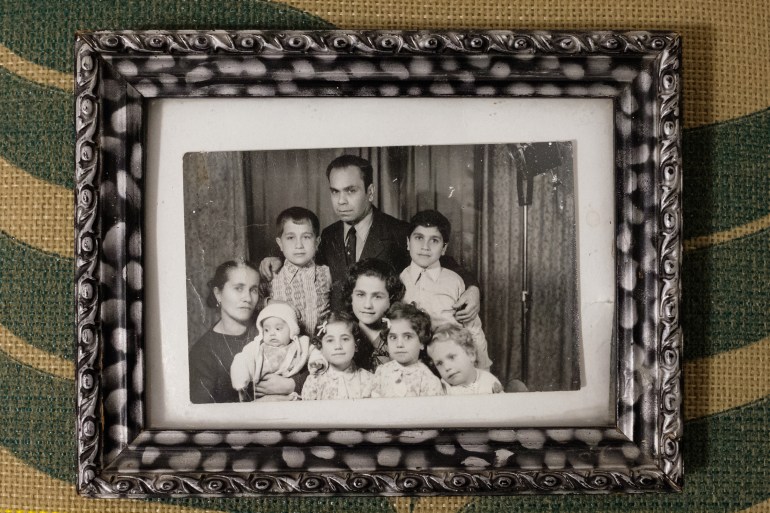
There was no other way.
Amaline’s Curve
I called Aunt Amaline to chat and to see when would be a good time to go see her. Her son was visiting from the US and I didn’t want to get in the way of her time with the kids and grandkids, but I did want to see her and get my own family time.
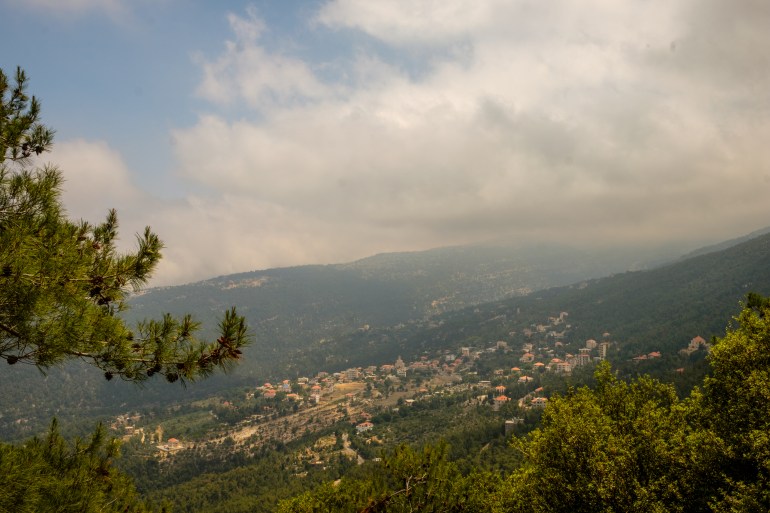
Then I have to keep heading north to the ˜village on a two-lane highway with no median. Not much better.
The anxiety only starts to dissipate when I turn onto the tree-lined village road, exuding the smell of pine to welcome me. My aunt’s house is on a curve that some village people call “Kou’ Amaline” or “Amaline’s Curve”
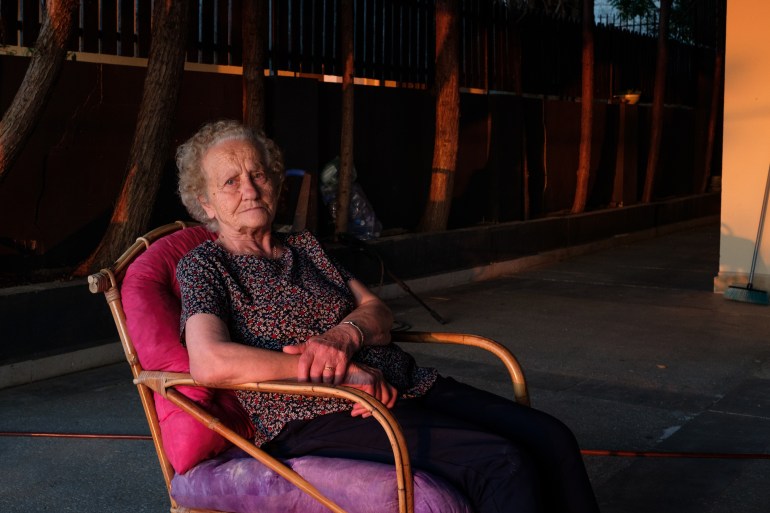
On this visit, I had told Aunt Amaline on the phone, I wanted to get some grape leaves and see if I could preserve them myself. Of course, the mere mention of this idea to her meant that Aunt Amaline would make a dish of stuffed grape leaves, ready to eat as soon as I arrived.
The tangy vegetarian stuffed leaves were so so tender, the yoghurt was so cool and creamy. Somehow, dipping them in that yoghurt brought out the tanginess even more,
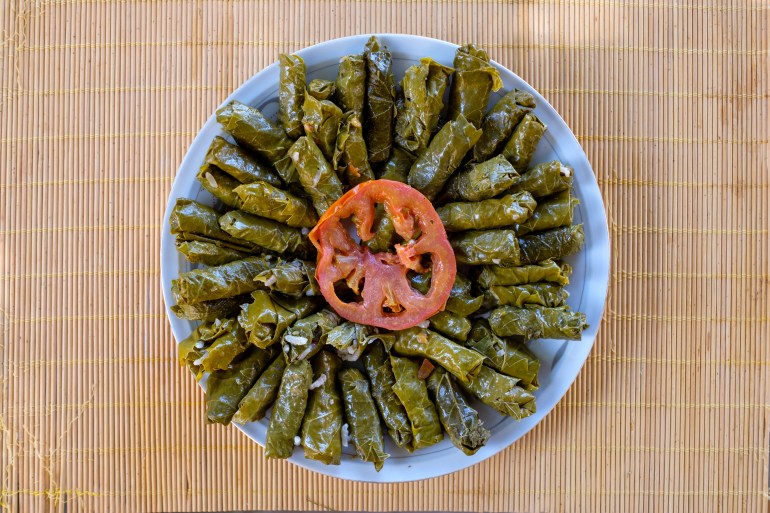
“This is the best time to pick them. If you don’t use water and salt to pack them, you have to check on them after a week or two to make sure they don’t mould. If there’s no mould by then, they’re good. You can freeze them too but that’s no longer an option in Lebanon.”
See, where Aunt Amaline lives, in Mazraat al-Toufah, there are only four hours of government-provided power a day, and she and the other villagers have to supplement that with a few hours on a generator. So freezers are tricky.
It’s been like this all over for the past two years or so, as Lebanon’s economic crisis tears at the country.
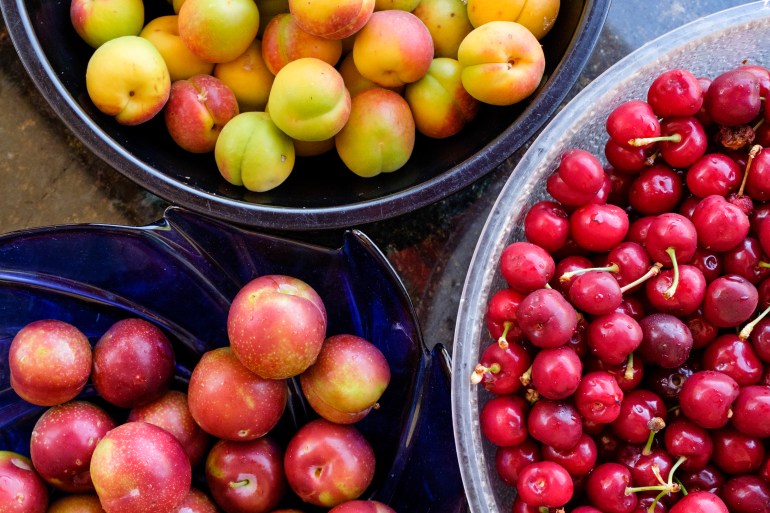
It’s hard to figure out which hours are provided by the city and which come from the generator, so I’ve gotten used to unplugging the refrigerator when I need to use the washing machine (for example) because the generator can’t support both and I never know when it’s running.
But, I keep reminding myself, while my labneh doesn’t last as long as it used to, at least things are not as bad as they were in October last year – when there was no government electricity at all for several days.
And also, at least Lebanon will always have its flagship, unspoilable, food: zaatar.
How to zaatar
Zaatar is something Aunt Amaline knows well.
She explains how it is used differently depending on when you pick it. If you pick it young, you can eat it fresh or in salads because “It’s most tender before it flowers.

“It’s also best not to mix everything at once. Sesame has oils that change the taste of the thyme. Keep them separate and mix just enough for what you need.”
She knows this sounds like an insane amount of work for the average city dweller.
“Yes, it’s easier to buy zaatar but how will you know what is in it? They could put grass or wood in it to mass-produce.”
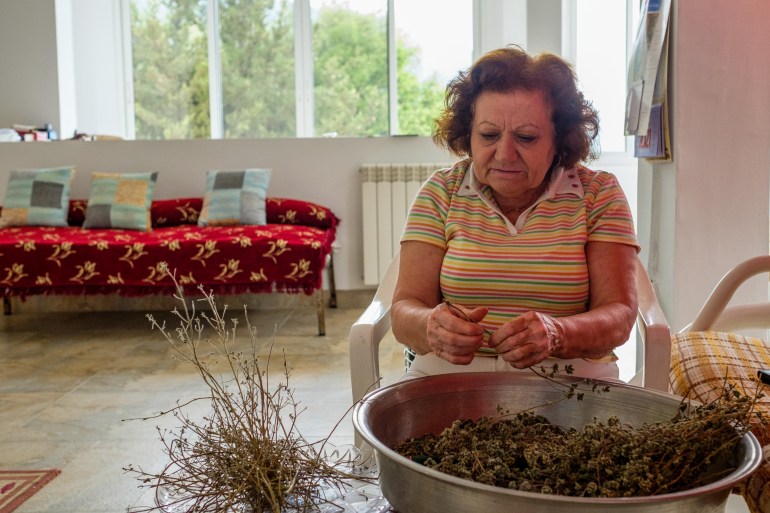
That smell, whether green zaatar just plucked or dried zaatar permeating our days as it wafts from the bakeries, is so inherently familiar to the Lebanese that it’s the first thing people think to send overseas to their relatives in the diaspora as a reminder of home.

Right now, at Aunt Amaline’s these thoughts are easy to push away as we enjoy the stuffed grape leaves and I lean back in my chair when we are done.
Never one to sit idle, Aunt Amaline puttered a bit then suggested we go visit her sister, my Aunt Mary, who is around 99 years old and lives nearby with her daughter, my cousin Salma.
Actually, Aunty Mary is probably older, because during her generation they would often register newborns long past their actual birthday.
Salma’s herbal tea
My Aunt Mary and my cousin Salma live in Dahr el Mghara overlooking the village. Salma’s home is lovely, the result of her many years of hard work as a teacher.
Now retired, the 72-year-old is taking care of her mother and making magic out of her rambling terraced garden.

There are always roses too, although this year there are fewer rose bushes because there was a water shortage that kept her from planting too many. She still goes out to pick wild flowers for her herbal tea, which has 11 ingredients.
“I wash everything before I dry it. I make my mouneh because that way I’m sure that it is clean and organic.”
Growing up, Salma learned a lot about preserving and the foods growing around her from the time she spent with her paternal grandfather, Moussa Elias, who was very knowledgeable in preserving food and an expert on honey.
She also learned some from my Aunt Mary, but Aunt Mary was busy with seven other children, most of whom were younger. So Salma, left to her own devices, would venture to other homes in the village, connecting with the village elders and learning how each family made things their own way.

“People are making a lot more mouneh now,” she says. “Things have gotten really expensive and people realised the worth of the land. They’re respecting what they had forgotten.
“We would live better if we all had that connection. You can’t pick a wild flower, look at it, smell it and not feel good.”
She’s happy to show me the different things she has made and put up in her pantry, some of the jams she uses when she’s baking a dessert, or simply spread on a bit of bread at breakfast.
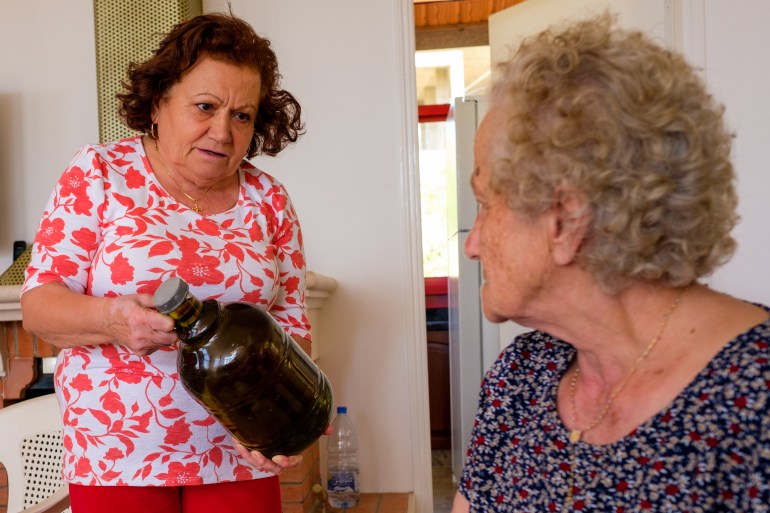
Salma’s pride in her preserves is obvious, she exudes that practical knowledge that comes from long years of making something by instinct. And she doesn’t use fancy words to describe what’s what.
“If you hold up the plate sideways and the jam doesn’t slide off, you know it’s done.”
Aside from plum preserves, Salma’s cupboard shelves groan under the weight of berry molasses, olives, olive oil, herbal tea, dried mint, even handmade soap. And yes, of course, there is zaatar, carefully gathered, dried and ground by Salma’s own hands.
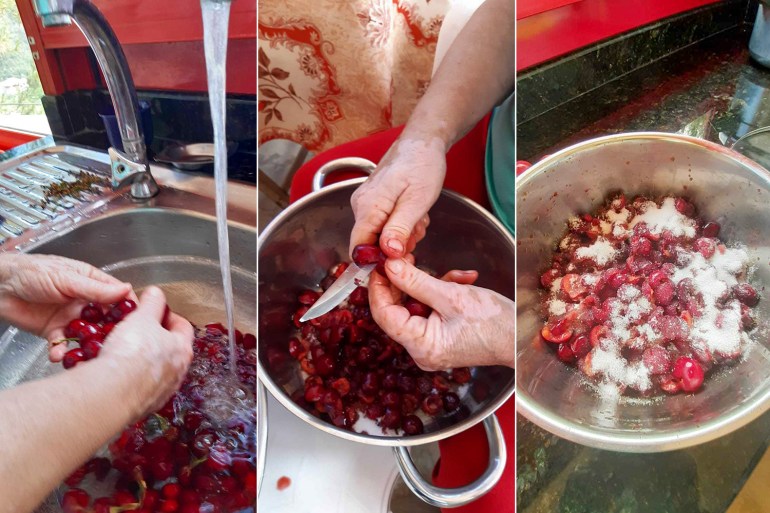
Curious, I asked her who took the photos, and she told me it was her grandnephew who had come to spend some time with her.
Looks like she’s passing on the mouneh baton her elders passed on to her.

